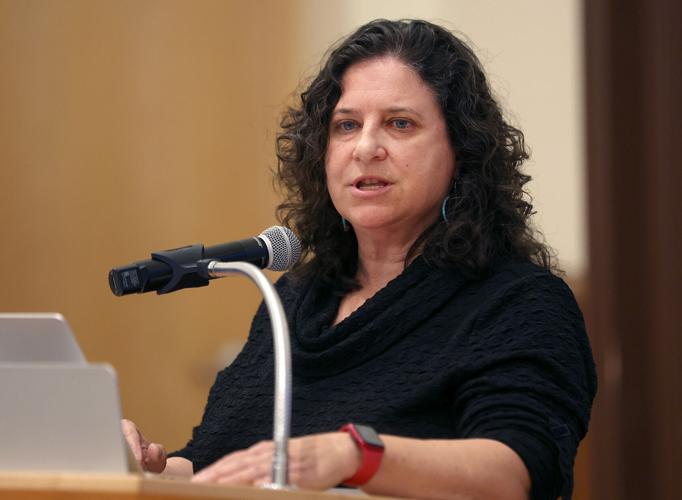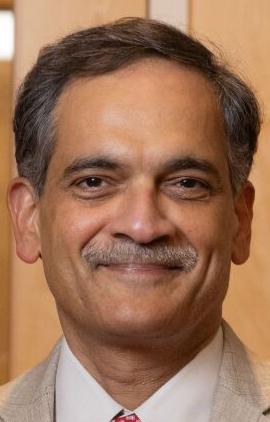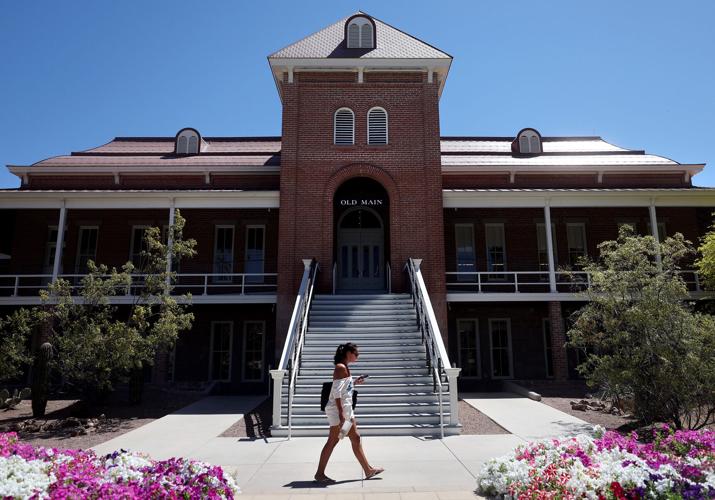University of Arizona Faculty Senate leaders are asking all faculty to vote in an online ŌĆ£referendumŌĆØ urging UA President Suresh Garimella and the Arizona Board of Regents to defend against the Trump administrationŌĆÖs ŌĆ£ideological attacks on universities and higher education.ŌĆØ
Specifically, the referendum asks Garimella to sign an April 22 letter from the American Association of Colleges and Universities or AAC&U, titled ŌĆ£,ŌĆØ which now has more than 550 signatures from university presidents across the nation, though none of ArizonaŌĆÖs three public university presidents. That letter states that while the signing universities are ŌĆ£open to constructive reform and do not oppose legitimate government oversight,ŌĆØ they ŌĆ£must oppose undue government intrusion in the lives of those who learn, live, and work on our campuses.ŌĆØ
People are also reading…

Chair of the Faculty Leila Hudson
An email sent out Tuesday by UA Faculty Senate leaders, calling for the vote, says, ŌĆ£Ongoing attacks on American universities threaten bedrock principles of a democratic society, including individual and inalienable rights of free expression, association, petition, and inquiry. The public land grant mission of higher education in the state of Arizona and the professional academic traditions of inclusive, critical, and free research and teaching in our state and across the country must be protected.ŌĆØ
The email was sent by Chair of the Faculty Leila Hudson, Secretary of the Faculty Katie Zeiders and Faculty Senate Chair Mona Hymel, and includes the faculty referendum with an anonymous voting system.
UA spokesperson Mitch Zak did not respond Tuesday to a request for comment nor to questions about whether Garimella intends to sign the AAC&U letter.

UA President Suresh Garimella
Hudson told the ├█╠ęė░Ž±AV in an interview Tuesday, ŌĆ£This has been building for a few weeks now and it comes from both internal pressures of our faculty constituency that we are elected to serve ŌĆö who are very agitated and disturbed about the wave of encroachments on universities (and) higher education values and traditions across the country.ŌĆØ
ŌĆ£ThereŌĆÖs that internal pressure that I mentioned, where just so many of our colleagues have reached out to us from all different disciplines, all different ranks and statuses,ŌĆØ Hudson continued. ŌĆ£We have the perception that this is quite a unifying issue for faculty at our university, and that compelled us to engage and try get specific data about how the faculty feels, so that we can more effectively engage with our administration.ŌĆØ
Another motivation, Hudson said, is a nationwide mobilization of other universities in a ŌĆ£mutual defense compact.ŌĆØ The idea is that an attack on one university should be countered by an alliance of as many universities as possible, so that universities can more effectively rally and defend their shared mission, she said.
Since the Jan. 20 inauguration, the Trump administration has delayed, frozen or cut various forms of federal research funding to universities, demanded the end of diversity, equity and inclusion activities, revoked numerous student visas and deleted some international studentsŌĆÖ status in a federal database, and made specific ideological and administrative demands of universities including Harvard and Columbia, among other actions targeting higher education.
The faculty referendum also asks Garimella and ABOR to:
ŌĆö Legally contest and not comply with unlawful demands that threaten academic freedom, university governance, and the constitutional rights and safety of students, faculty and staff.
ŌĆö Participate in the establishment of a Public Land Grant University Mutual Academic Defense Compact.
ŌĆö Commit financial, legal and organizational support in responses to ŌĆ£political, partisan, and ideological attacks on the integrity of American universities and higher education.ŌĆØ
ŌĆ£The AAC&U letter is something that we saw with enthusiasm and we were disappointed, although not surprised, that our Arizona public universities have not signed onto that letter, but I think we would be in good company if our president did,ŌĆØ Hudson told the Star.
None of ArizonaŌĆÖs three public university presidents ŌĆö Garimella, Arizona State University President Michael Crow and Northern Arizona University President Jos├® Luis Cruz Rivera ŌĆö has signed the AAC&U letter. The Republican-controlled Legislature has threatened ArizonaŌĆÖs universities with loss of state funding if they donŌĆÖt honor U.S. President Donald TrumpŌĆÖs order to dismantle DEI programs.
Nolan Cabrera, a professor of educational policy studies and practice and a faculty senator, said this is a test for the UA administration. ŌĆ£Are they going to stand for our core values by signing the AAC&U letter or cave to the likely unconstitutional demands of the current administration?ŌĆØ he asked.
Elaborating on the request to legally contest federal "unlawful demands", Hudson said faculty leaders werenŌĆÖt referring to any specific courses of action, but said that lawsuits or legal actions shouldnŌĆÖt be off the table.
The Faculty Senate effort comes on the heels of more than 60 Regents and Distinguished professors at the UA sending a letter April 18 to Garimella urging him to defend the UAŌĆÖs values, which they said are ŌĆ£under existential threat.ŌĆØ
In his response, Garimella detailed the importance of federal and state funding to the UA, and noted the university has created a bridge funding program to support research in the face of paused or stopped federal grants. He did not address specific actions requested by the professors, including issuing a statement affirming commitment to the principles of freedom of speech, equal protection, and due process under the law; and protecting international students and scholars who fear deportation.
Garimella noted that UA depends on ŌĆ£more than $470 million in federal research grants, more than $380 million in state funding, and over $70 million in federal Pell Grants supporting 22% of our student body.ŌĆØ
ŌĆ£We also have a responsibility to comply with the laws and guidelines that apply to our public university,ŌĆØ he wrote to the professors last week.
In the UA referendum, faculty members will be able to vote Tuesday through 5 p.m. Friday. The results will be presented in a Faculty Senate meeting Monday and will also be shared with public land-grant universities like the UA across the U.S.,┬Ā ┬Āand with shared governance bodies of Arizona universities.
Hudson said the anonymous voting is the norm in referendums like this, especially since many faculty members are employed on a contingency basis and do not always feel comfortable taking a public stance.
ŌĆ£So many of you have reached out to urge University of Arizona leadership to join our land grant public peers across the nation in taking a stand against the wave of aggressively politicized attacks on higher education,ŌĆØ said Hudson, Zeiders and Hymel in the email.
Hudson referred to the Regents and Distinguished professorsŌĆÖ letter to Garimella, saying it was ŌĆ£very inspiringŌĆØ to see a group of the ŌĆ£most prestigious and productive facultyŌĆØ come together across disciplines and viewpoints to articulate their demands.
ŌĆ£Reactively abandoning established principles and long-standing policies will compromise our land grant academic mission,ŌĆØ they wrote. ŌĆ£Concessions of our professional principles, which may appear at first expedient, can invite further ideologically based attacks and hasty changes that place our students, staff, and faculty at risk.ŌĆØ
Some faculty members spoke out immediately Tuesday in support of the Faculty SenateŌĆÖs effort.
ŌĆ£A university that hampers freedom of thought and conscience in response to political and funding pressure will not inspire young people to follow their imaginations to wherever they need to go,ŌĆØ said Matthew Abraham, a UA professor of English. ŌĆ£LetŌĆÖs not let political expediency destroy a central pillar of the American democratic experiment.ŌĆØ
Vanessa Perry, a professor of education, said she is proud of her fellow faculty for making use of shared governance to encourage ABOR and Garimella to stand with the rest of the faculty. ŌĆ£This moment will be remembered for how higher education leaders cowered or stood valiantly,ŌĆØ she said.
Gary Rhoades, a professor of higher education, said the referendum offers the UA administration the opportunity to ŌĆ£unite in support of the bedrock principles of our university, in service to our students, staff, the communities and state we serve, and in fulfillment of our land grant mission.ŌĆØ
ŌĆ£In calculating risk, some universities have focused only on the risk of not complying with governmental demands, which should be distinguished from the laws and due processes of the land,ŌĆØ said Rhoades.
ŌĆ£That overlooks the very real costs of forms of overcompliance that abridge our defining freedoms and work, and that compromise our integrity and standing, as has become quite clear in the case of Columbia University,ŌĆØ which complied with some Trump demands, only to be met with escalating demands.
ŌĆ£I would urge, in the words of the AAC&U letter, ŌĆśconstructive engagement,ŌĆÖ not self-destructive detachment from the faculty and complicity with governmental threats ŌĆö distinct from laws ŌĆö that compromises, and sacrifices quite literally who we are as a diverse, broadly accessible institution seeking to enhance equity and inclusion by meeting and respecting our students and surrounding communities where they are,ŌĆØ Rhoades said.

The University of Arizona┬Ā
Reporter Prerana Sannappanavar covers higher education for the ├█╠ęė░Ž±AV and . Contact her at psannappa1@tucson.com or DM her on .















